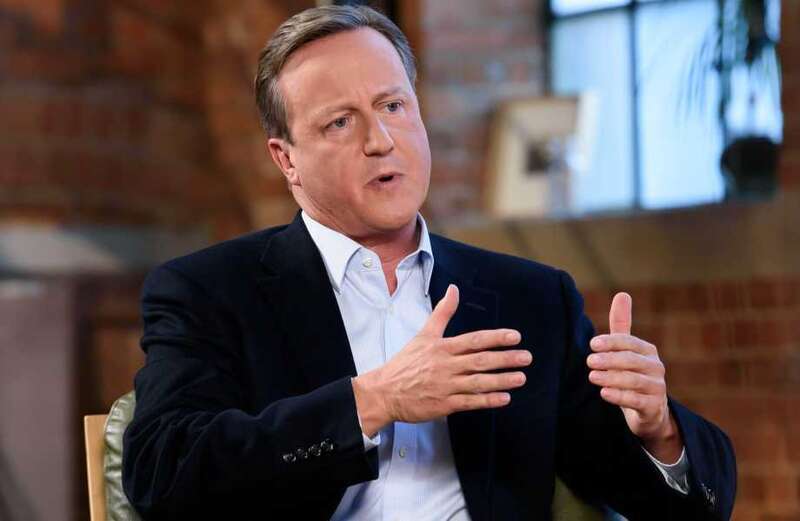DAVID Cameron replaced Gordon Brown as Prime Minister of the United Kingdom in 2010 and oversaw many significant milestones.
Here's what we know about his time as leader and why he left his post.

When did David Cameron become Prime Minister?
David Cameron was Prime Minister of the UK from May 11, 2010, to July 13, 2016 - making his tenure six years and two months.
Cameron became the Conservative leader in 2005 when he pipped David Davis to the post with 68 per cent of MPs' votes.
Five years later the country went once again to the polls, with Cameron leading the Conservatives... not to victory, but to a hung Parliament.
 Are there illegal baby names? Surprising monikers that are BANNED in other countries, from Sarah to Thomas
Are there illegal baby names? Surprising monikers that are BANNED in other countries, from Sarah to Thomas
The Tories won the largest number of votes and seats in the UK, but still fell 20 seats short of a majority.
This was only the second time since the Second World War that an election had resulted in a hung Parliament, and no party seemed to have prepared for the eventuality.
Prime Minister Gordon Brown resigned as a result, leading to Ed Miliband being elected the party's new leader in September 2010.
The Liberal Democrats - who hadn't performed better since 1988 - joined Cameron's government, and the ConDem coalition was born.
At 43, Cameron became the youngest Prime Minister since Lord Liverpool in 1812.
Nick Clegg, leader of the Liberal Democrats, served as deputy Prime Minister.
What were Cameron's main pledges?
Cameron repeatedly warned about the need for austerity in the run-up to the election.
He pledged Britain would be "business" ready and promised the "most radical decentralisation of power this country has seen for generations".
The Tory leader also promised to eliminate the bulk of the deficit - which he failed to do.
He also introduced free schools - there are now more than 300 of them.
 All about Rachel Nickell who was murdered in front of her son Alex Hanscombe
All about Rachel Nickell who was murdered in front of her son Alex Hanscombe
As education secretary, Michael Gove rewrote the curriculum in primary schools in 2013 - to the condemnation of teachers and unions.
Cameron vowed to stop A&E and maternity wards closures, but failed to do so.
He also said he'd scrap the Human Rights Act and replace it with a British Bill of Rights - which he never managed to do.
Theresa May would later return to that policy to great controversy, and also fail to implement it.
Cameron also vowed to make the UK "the world's first low-carbon economy", including becoming a world leader in green goods and services.
This was not fulfilled, with Britain around sixth in the field in the time Cameron was in office.
However, central government emissions were cut by 14 per cent in their first year.
Other pledges included an annual limit on non-EU economic migrants, which wasn't met.
What happened at the 2015 election?
To everyone's surprise, Cameron's Conservatives won an outright majority with 306 seats (a 36.1 per cent vote share).
Under Miliband, the Labour Party increased its share of the vote slightly to 30.4 per cent, but incurred a net loss of seats and returned with 232 MPs.
This was the lowest tally since 1987.
Cameron came under increasing pressure to call a referendum on UK's membership of the EU, and called one.
This would become the defining issue of his premiership, with Cameron campaigning to remain as part of the EU.
The country voted to Leave Europe on June 23, 2016 - and Cameron quit the morning after.
He also retired as MP of Witney, where he'd served as a constituency MP since 2001.
He was replaced as PM by Theresa May, who was in charge for three years from 2016 to 2019.
However, Cameron returned to politics on November 13, 2023, forming part of Rishi Sunak's cabinet.
He replaced James Cleverly as Foreign Secretary, with Cleverly replacing Suella Braverman as Home Secretary.
With his role, Cameron also took a seat in the House of Lords.
We pay for your stories! Do you have a story for The Sun Online news team? Email us at tips@the-sun.co.uk or call 0207 782 4368 . You can WhatsApp us on 07810 791 502. We pay for videos too. Click here to upload yours.
